"Michael". The March offensive of the 1918 Kaiser army in France. Part of 1
How was the situation on the French front at the beginning of the last campaign of the First World War?
The 1917 campaign of the year ended for the German bloc to no avail. And although the all-Union offensive, due to the weakening of military efforts on the part of the revolutionary Russian republic and military setbacks on the Italian front, did not take place, the campaign showed a serious offensive power of the Allies, which intensified with each new transfer of American troops to the continent. In the face of the USA, the Entente acquired the much needed reserve of manpower she needed, while Germany’s human resource was drawing to a close.
Within Germany, the attitude of the Reichstag towards the government became increasingly oppositional. The High Command represented by P. Hindenburg and E. Ludendorff, having risen to opposition to both the Reich Chancellor and the Reichstag, objected to the implementation of internal reforms before achieving a military victory.
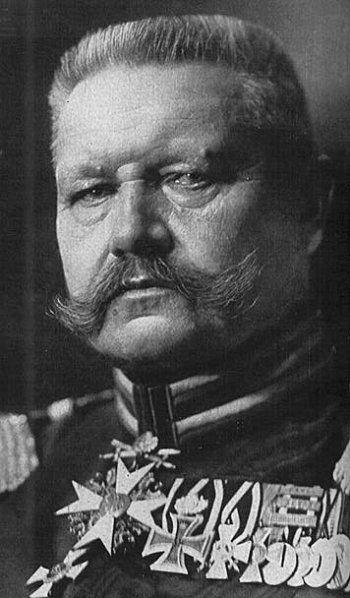
1. P. von Hindenburg.
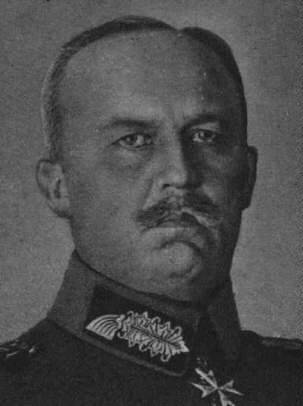
2. E. von Ludendorff.
At the same time, the military position of Germany (for the first time since the beginning of the 1914 campaign of the year) was rated as very favorable. The reason for the optimism of the General Staff were the Romanian and Italian disasters, as well as the gradual withdrawal from the war of Russia. Separate peace with Russia and then with Romania became the most important strategic factor - Germany finally has only one main front. The Eastern Front ceased to exist, but the fact that over the 3,5 of the year he had already played his role (and time worked inevitably on the Entente), and also that after the official “demise” he continued to delay the large forces of the powers of the German bloc, while not perceived. There was only one thing - the fact that at last the main forces of the German army could be directed against the British and French, and in the course of a decisive battle on the Western Front, one could try to achieve a military victory.
The conclusion of a separate peace with Russia and the occupation of grain-bearing Ukraine broke the blockade ring and gave hungry Germany access to a rich source of resources.
These events for almost exhausted Germany's 4 years struggle overshadowed all other unfavorable strategic factors that foreshadowed the closeness of the terrible denouement.
The coming 1918 year was to be the year of a decisive clash in the west. And each week of delay in the start of the German offensive meant an increase in the combat strength of the Entente troops — at the expense of the American troops arriving from overseas. It was necessary to achieve victory earlier than the American troops fully concentrate in Europe.
Already at the end of 1917, the German General Headquarters is adopting a plan for a decisive offensive on the Western Front, with the aim of completely destroying the enemy.
The victorious outcome of the war for the strategists of the Entente was beyond doubt. The Allies, also planning to bring the fight to the bitter end during the 1918 campaign, understood this very well. The more favorable economic situation of the Entente powers, the performance on the side of the bloc of rich and strong America, gave strength even to skeptics.
But in military terms, it was not so smooth. If the Germans' offensive plan at the beginning of 1918, was predetermined by an objective situation, then the allies had a different situation. At the beginning of the campaign there was no unified military command and control of the bloc, even within the same theater of operations. In the future, only a critical moment of the campaign forced the Allies to create a single operational command - the absence of which was so hard affected during the war. But after the defeat of the Italians under Caporetto in November 1917, it was decided to create the Supreme Military Council - the highest political body that coordinated the policy of the Entente countries in military matters. In February, the Executive Committee of the Supreme Military Council was established at Versailles 1918 - but this body did not have any command functions. And there was no coordinated operational action by the Allied Command.
This situation was one of the main reasons why at the beginning of 1918, the Allied Command did not have a definite plan of action for the campaign — although the Germans were considered more than likely.
In the French General Staff, the question of the immediate operational plan was raised in two ways: either an immediate offensive in order to warn the enemy or a waiting position - in order to accumulate the maximum forces arriving from the USA.
Chief of the French General Staff F. Foch spoke in favor of an offensive course of action. He believed that the British could strengthen their army with new sets, and also counted on reserves from the French colonies. Finally, in his opinion, the American troops could have reached the height of the operation. F. Foch's opponent was the commander in chief of the French Army A. - F. Petain, who insisted on defensive tactics. A. - F. Petain believed that until the Entente attains numerical superiority over the enemy (after American troops arrive in France in sufficient quantities), it is necessary not to put their armies under threat of defeat in parts, to refrain from a major offensive plan.
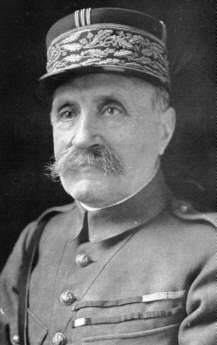
3. F. Foch.
Indeed, the combat composition of the Allied armies to the beginning of the campaign did not give significant numerical superiority - although the latter was on the side of the Entente throughout the war. By March 1918, the Allies were on the French front 178 divisions - 108 French (including 11 in February, still in Italy; the power of the French Infantry Division during this period - 9-10 battalions and 16-20 batteries; 11000 fighters), 57 English, Belgian 10, American 1 and Portuguese 2.
The massive, influx of American troops into France began only in the spring of 1918. The USA committed themselves by the end of the summer of 1918 to transfer the 2 million-strong army to France. The concentration of this powerful force and decided to wait for the Allied command.
It was decided to conduct an offensive operation only against Turkey - and the French command objected, fearing the diversion of troops from the West European theater of operations. However, the British troops in Flanders were reduced by 200000 people transferred to Mesopotamia and Palestine.
The British government during this period made little effort to increase its army in the West European theater. The composition of the British divisions was brought from the 13-battalion to the 10-battalion. Large forces continued to remain in England and on other fronts. But in January 1918, the British south to the Oise River extended their front - which, of course, weakened themselves even more. To prevent further weakening of the English front in France, the commander of the British expeditionary forces in France, D. Haig, even threatened with his resignation.
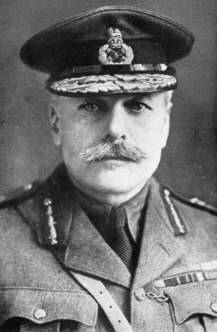
4. D. Haig.
At the beginning of 1918, the Allies remained in fortified positions, stretching from the North Sea through Newport, Ypres, Lens, S. Kantin, La Fer, Reims, Verdun, S. Miel, Pont a Mousson and further along the Alsace-Lorraine border to Switzerland.
The positions were occupied (from north to south): by the Belgian army (from Newport to Isersky Canal), to the south - by four British armies (2-I, 1-I, 3-I and 5-I - from Isersky Canal to Oise), further to the Swiss border, the French 6, 5, 4, 2, 8, and 7 armies (the 3 army in the area of Mondidier was in reserve, and the 1 army in the area near S.- Miel could be replaced and transferred to the reserve).
5. British infantrymen.
To be continued
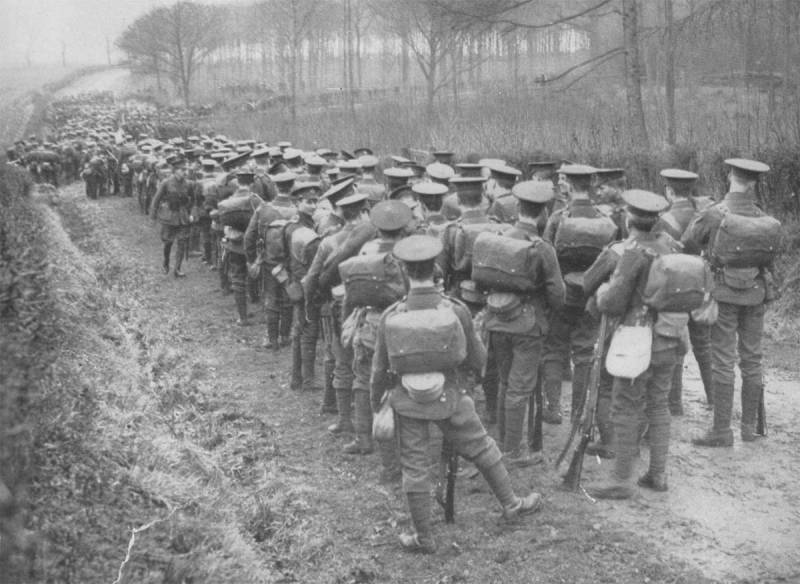
Information